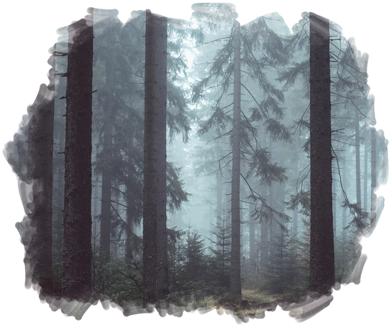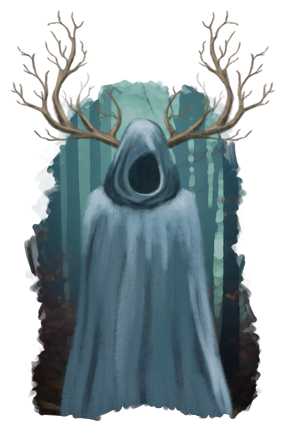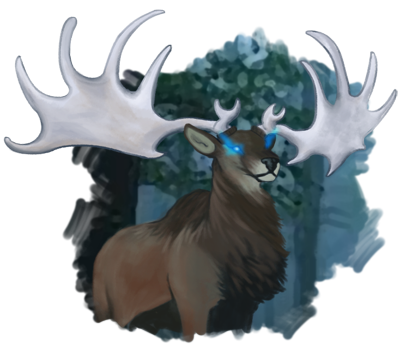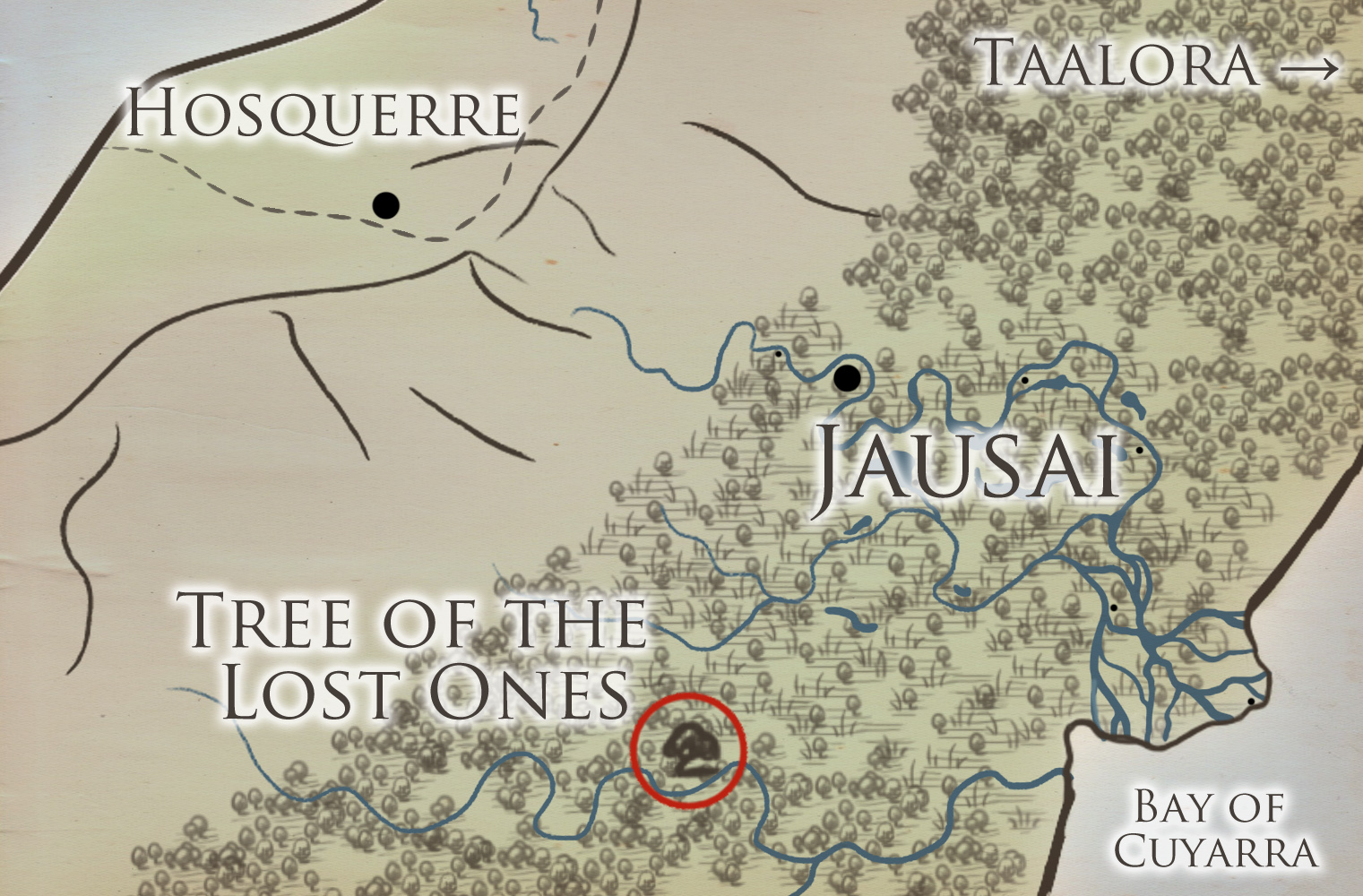Tree of the Lost Ones
- Three hours, twenty minutes. That was how late Äclan was.
Laufa chewed on her bottom lip as she leaned on the windowsill. It's still too early to panic, she told herself. Äclan was a good boy, but sometimes he got adventurous and lost track of time. The children must have gone too far today and it was just taking them a little longer to get back.
The front door opened and she whipped around, mouth already opening to tell her son off for staying out late. It slowly closed when she saw it was just her husband.
He stood in the doorway and gave a little shake of his head. "I was just at the Ainua house. Their boy admitted they'd been playing out along the game trail, but Äclan got bored and walked home early."
Laufa pressed a hand over her chest and took a deep breath. She turned back to the window and stared into the dark trees beyond. Deep within them lurked dire wolves, bears, Strangers... and her son.
Getting Lost
Kivans are a people of the forest. They build their villages in the lower boughs of the mighty Paavauhäs trees, above the wetlands that cover the floor of the Forest of Stars. The forest is notoriously dark due to weaver bats creating their nets among the canopy that catch leaves and form a natural roof to keep out sunlight even on a bright summer day. In some areas, the only light at all is what shines from the thousands of starflies that make the forest their home.In their twilit villages built among the trees, getting lost in the woods is a frequent concern. Trails criss-cross the forest from village to village (and, these days, most eventually lead to the big city of Jausai), but they are not always reliable. Rising water levels frequently flood roads, arboreal bridges get overgrown if not used frequently enough, and in the dark, it can be easy to walk right past your turn.
Forestry and how to navigate in the woods is an essential skill taught to children, but it isn't fool proof. Every year, someone will take a wrong turn or get turned around trying to navigate around a flooded area, and the forest simply gobbles them up. Sometimes bodies are found. Usually not.
Those whose bodies are not found are never referred to as dead. The proper term is lost. Kivans do not use the word 'lost' lightly when referring to a person. To describe a person as 'lost' means that they will not be seen again, for they have been taken by the woods, and into the care of Lord of the Lost.
- Äclan took a deep breath and tried not to cry. He'd set off for home at least an hour before sunset, but now, even when he came to a patch of sky through the canopy, he saw nothing but darkness. At nine years old, he was too old to cry, but boy did he want to.
It will be just around this next bend. But he'd been sure home would be just around the last twelve bends, and with every bend, the confidence came thinner and thinner. Äclan rounded the trunk of another tree broader than his house and his foot came down in water. He jerked back and shivered, squinting in the dim light.
A cluster of starfly cocoons dangling overhead shone a gleaming reflection on the still water of the swamp. The placid water spread ahead of him as far as he could see and he tried to swallow his fear. Had his trail led him to a swamp for some reason? Or maybe... maybe this gap between the tree trunks hadn't been a trail at all.
Scared, wet, cold, and so very alone, Äclan curled up in a gap between the roots and at last allowed himself to cry. Night loomed all around, and every drip of water or crackle of leaves hinted at wolves or worse coming to claim him. He hadn't the faintest idea in which direction home lay, nor any hope of reaching it. Finally, Äclan accepted what he had feared at the back of his mind for the last few hours. He wasn't merely disoriented, he was lost.
He didn't know how long he sat there sobbing before he heard the approach of footsteps. He scrubbed tears from his face and looked up with a leap of hope. Someone had come to find him! Approaching him through the trees was a cloaked figure carrying a lantern that shone with the blue-green light of starflies. As the figure came closer, Äclan realized with dismay that it wasn't his father to take him home at all. From the figure's head sprouted tangled tree branches like antlers, and nothing but darkness lay beneath the hood.
The Lord of the Lost
Havaihäsalot, "Lord of the Lost", features in many Kivan folk tales. While Tauvaastäit the Great Elk is the master of the forest, the Lord of the Lost is the caretaker of all those who go missing. He is the reason their bodies are never found, for the lost are not dead, not truly. They have simply been taken by the Lord of the Lost, who led them safely to the Otherworld.There, they will live peacefully in the paradise of endless youth and bounty. They cannot return to the human realm, but they are safe and they are happy. The Lord of the Lost is their guardian now, and he will protect them to the end of time. One day, when a person dies, they can also travel to the Otherworld, and be reunited with their lost loved one.
The Lord of the Lost is looked upon with both love and fear. Love, because he protects those who need it most and safeguards them from the dangers of the forest. Fear, because to look upon him means that you have truly become lost and will not make it home. Meeting him in the woods means both that you are out of danger, but also have lost any chance of returning to your normal life.
-
Laufa held her lantern high as she made her way through the woods. "Äclan! Äclan, where are you?!" Her husband had said to wait until morning to search the woods, for what luck would she have wandering around in the middle of the night? But Laufa had been born on the day of the creeping vine, and named for its persistence. She could not go to sleep when her little boy was still out there.
Bats squeaked in the night. The village was far behind her now; she was alone in a sea of trees. For hours she'd called her son's name with no response but the rustling of leaves. Deep in the forest, far from any other human, she prayed to every god that Äclan would materialize out of the shadows. When she saw movement ahead, her chest throbbed. "Äclan?!"
It wasn't a scuff-nosed boy who stepped out of the trees but a towering Great Elk. Blue light glowed from his eyes and Laufa jolted to a stop. She bowed deeply before Tauvaastäit and said, "Thank you, Grandfather, for allowing me passage through your forest."
The hand not holding the lantern scrambled around her waist to reach into her hämmäi bag and pull out the little pewter ring within. It was intended to be an emergency gift for the Lord of the Dead, but other gods also required gifts. "Please, accept my offering."
She held it on her palm, arm stretched out. The massive elk dipped his head and took the ring in his mouth, his soft nose nuzzling her palm. The ring vanished into his mouth and he spoke. "Thank you, child. I will lead you back to your village." His voice was as old and deep as the roots. Laufa was about to thank him again, but stopped herself. It was unthinkable to question an offering of safe passage from the Grandfather of the Woods, but....
"Thank you for the offer, my lord, but I cannot accept. I already know the way back, but right now I am looking for my child and cannot return home without him."
She waited, tense like a rabbit before a wolf, prepared to see the elk turn away and curse her to be forever lost. Instead, Tauvaastäit gazed at her in puzzlement. "You search for the boy who wandered the woods this evening?"
Laufa nodded.
The elk slowly turned his head side to side, as if listening for something. When his gaze fixed back on her, he said, "You will not find him. He is lost."
The path seemed to drop away beneath her and a wave of dizziness threatened to knock her down. Lost.... Her son was lost.
"What, then, can I offer in exchange to the human who gifted me the treasure from their hämmäi bag but who needs no guide? What gift could quell the aching of your heart?"
"There is nothing." Laufa struggled to find her voice in the depths of her grief. "Not unless you can return my son to me."
"I cannot. He is within the domain of Havaihäsalot now, and beyond my reach. But perhaps...." The elk scraped the damp earth with a hoof, lowered his head to the small hole, and opened his mouth. Her pewter ring tumbled off his tongue and into the hole. His nose pushed soil over the ring and when he raised his head again, he began to sing.
The song of the Grandfather of the Woods was deep, echoing, and full of longing. He sang a song without words that turned Laufa's sorrow into a voice on the wind that flowed beneath the canopy. As he sang, a sprout poked through the earth in the place where the ring was buried. Each new note tugged it further upward. The sprout became a sapling, and then the song's grief poured into its growing trunk, twisting into its bark. The sapling stretched higher and higher, branches reaching out, trailing leaves flowing back down again. When the song finally faded away, a willow tree towered over Laufa's head.
The Tree
The veil between our world and the Otherworld grows thin beneath the boughs of the tree. Those who are lost can never return to our world, but around the tree, their presence can be felt. Those who have lost a loved one journey to the willow tree deep among the Paavauhäs trees in order to be near their loved one once more. Although you cannot see the lost, if you sit down, close your eyes, and open your heart, you will feel their nearness as they, too, attempt contact from the other side of the veil.Visitors
Many people visit the tree each year. The most common category are parents, as children are the most vulnerable to becoming lost in the woods. Entire families often travel to the tree each year around the anniversary of the day the child became lost. There are grey-haired visitors who have come every year for thirty years in memory of a long-lost child, alongside freshly-widowed mourners making the trip just after having accepted the loss of a spouse.The mood around the tree is bittersweet. Outwardly, it is joyous, for this is where you can visit your lost friends and family and be reunited. It's a happy occasion, and to feel the nearness of the lost one is like getting one more hug out of them. Despite this, many visitors have difficulty keeping a smile on. Some are unable to see the tree as anything more than a memorial to the dead. Smiles with glistening eyes are a common sight around the tree.
But the people memorialized at the tree are not dead. They are lost, which means there is no body to find. If a lost person's body is eventually uncovered, it means they were never truly lost to begin with, and can be given a proper funeral. Their loved ones will no longer visit the tree.
Gifts
The roots around the tree are strewn with left offerings. Visitors often bring gifts for their loved ones, like dishes of a favourite food or a newly-knit sweater. Leaving these items can help to attract the attention of the lost one in question, and draw them to the tree to visit.
Taking an item left for the lost is deeply taboo. If you do, the lost soul it was intended for is liable to follow you home and haunt your nightmares until you return it. Every few months, a shaman visits the tree to clean up and make room for more gifts. He or she meditates to commune with the Otherworld and receive permission to remove offerings. The shaman burns or buries what they collect.
Taking an item left for the lost is deeply taboo. If you do, the lost soul it was intended for is liable to follow you home and haunt your nightmares until you return it. Every few months, a shaman visits the tree to clean up and make room for more gifts. He or she meditates to commune with the Otherworld and receive permission to remove offerings. The shaman burns or buries what they collect.
Popular Culinary Gifts to Leave for the Lost
Hiläit: Steamed cabbage leaves wrapped around potato dough, stuffed with beans, onions, and pork.
Pökoetruulkka: Potato flatbread
Fried Grasshoppers: Dusted with garlic and salt, often left out for lost children.
Tuoekivökä: Rice cakes filled with nuts and honey
-
Laufa folded her legs and sat beneath the tree. The hanging leaves of the tree formed a dome over her, and already starflies landed on the swaying branches to create a cave of glittering light. She pressed her fingers into the damp soil, closed her eyes, and opened her heart.
She hummed a lullaby, the same one she'd song to him while rocking him in the cradle. At first she felt nothing but the night breeze, until a flicker of warmth brushed her hand. Her skin prickled with the sensation of someone nearby. For a split second, she thought of forest wights, until the presence settled into something warm and familiar.
"Darling," she whispered, and reached out blindly. From the other side of the veil, her son squeezed her hand.
Fact or Fiction?
The story of Laufa and the tree was first recorded in the early Fifth Age, but is set a few centuries before that. Though the tree and the traditions surrounding it concretely exist, no one knows what village Laufa allegedly came from. No one is willing to dig up the tree to see if a pewter ring is buried beneath. For that matter, there is no proof that the Kivan gods tangibly exist, either.
Some propose that people long ago stumbled upon an unusual tree and invented a story to help ease the pain of losing someone. But then, willow trees don't live more than a century, but this tree has existed on record for hundreds of years. Perhaps there is more to the tree's story after all....
The Tree of the Lost Ones
Type
Tree
Parent Location
The tree is located near the Lä River, in around the middle of the Forest of Stars. It's about a ten hour walk from the heart of Jausai, though the city is so sprawling that those on the outskirts have only a six or seven hour walk. From other villages scattered throughout the forest, it takes between an hour and a full day of travelling to reach it, but never more than a day.
The Otherworld
The Kivan conception of both the afterlife and a land of spirits, gods, and magical beings
Tauvaastäit
(tɑu‧vɑː‧steit) An ancient Great Elk, known as the lord of the forest and all its denizens. Revered as a god by Kivans
Hämmäi Bag
(hæm‧mei) A small black pouch carried by Kivans that holds a potential gift for the Lord of the Dead should they die unexpectedly
Shamans
Kivan spiritual leaders. Addressed as 'Singer', and said to travel to the Otherworld to negotiate with spirits.
Forest Wights
Ghosts that lurk in the forest. They are allegedly lost souls who had nothing to pay the Lord of the Dead and were rejected from the Afterlife. Most likely purely mythical









